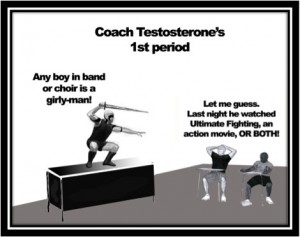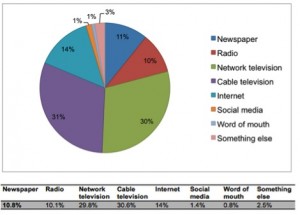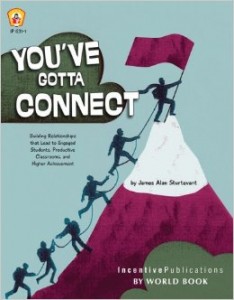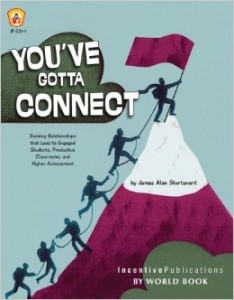Teddy Roosevelt called the presidency a bully pulpit. In other words, presidents have credibility. People listen when they speak. A bully pulpit equates to responsibility.
Teachers occupy a bully pulpit. But teachers need to be careful…DARNED CAREFUL! One could utilize their bully pulpit and unintentionally sabotage potential relationships with students.
This post will address two issues:
- Teacher disposition towards diverse students
- Teacher disposition towards controversial topics
How would students describe you? What’s your moniker? What’s your rep? The image you cultivate is important. It’s darned difficult to alter student perceptions, and they travel from class to class and year to year. Your mission is not to connect with just the students with whom you relate, but all kids. Strive for diverse appeal; connecting across the entire attitudinal spectrum.
The last thing you want is to become “The Jock Teacher” who has no use for the non-athletes, or the “The Drama Teacher” who thinks all the jocks are morons.
You should also be careful about expressing too many opinions. You probably have strong views about many issues like gay marriage, legalization of pot, immigration, healthcare, abortion, and bullying. That’s fine. It’s okay to be passionate. But when you’re in front of students, it’s better to maintain neutrality. Of course you should still play devil’s advocate, but be the annoying Socrates that challenges kids to defend their views regardless of their positions.
Students will ask about your opinions, but be cool, it’s more important to encourage their critical thinking than indoctrinate them into your worldview. Boy, is this a tall order for many!
The yearning to indoctrinate is totally understandable. You’re trying to help your students grow…evolve. But please remember, your worldview may be skewed. One can still hear complaints about the evil mainstream media. But the mainstream media has ceased to exist. Now, people get their information from a variety of sources. Checkout the July 2013 pie chart from Business Insider, which illustrates where people get their news:
Sadly, many Americans (teachers included) consume news from sources that cater to their bias. They become convinced they’re right and everything they hear in their carefully selected media outlets, confirms it. Resist the powerful urge to share YOUR truth… believing that if students could just hear you out, they’ll come to the right conclusion. This is dangerous and erects HUGE barriers between outspoken teachers and kids who may have equally strong contrary views. Not only can broadcasting your opinions too much and too forcefully create obstacles, it can also foster significant animosity. Don’t divide your class this way!
Be advised…it doesn’t matter what you think. The goal is to help them think. There are reasonable arguments supporting opposing sides of most issues. If you’re always chipping in your two cents, it’s going to alienate the students who don’t agree with you. So cease and desist!
As a younger teacher, I had to work at this! I know I’ve evolved because of an experiment I conducted during the 2004 and 2008 Elections. We discussed the events leading up to the elections daily. From the beginning of the year my students kept pestering me, “Whom are you voting for?” I refused to respond. A number of positive things happened as a result:
1. My students started to analyze everything I said searching for bias. Hopefully they utilize this skill when evaluating media sources.
2. They started to piece together patterns of what the Democrats and Republicans support. Where does Mr. S fall?
3. Finally, because I wasn’t pushing an agenda, everyone relaxed and class discussions were cordial. If they got heated, I was a trusted nonpartisan voice of reason.
Oh by the way, the day after each election I revealed my choice. Before I did this, each student was required to guess my vote and provide at least two reasons for their selection. The answers were fabulous, and they were split right down the middle, just as many had it right as wrong. When I revealed my choice, many students were stunned. I succeeded. Sorry dear reader, I’m not tipping my hand.
Keep these prompts in mind:
How would students typecast me?
What are benefits and liabilities to my typecast?
Which students may be turned off by my typecast?
How will I recognize if a student is repelled by my typecast?
What are controversial issues I care deeply about?
How could I handle these issues in a balanced, unbiased way?
How should I respond if students ask me my opinion?
This is my book: “You’ve Gotta Connect”



